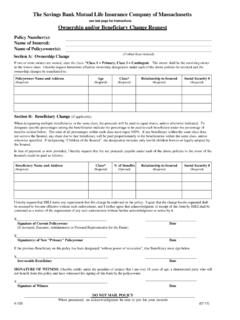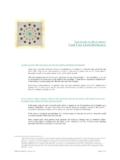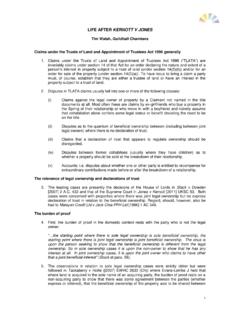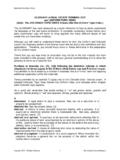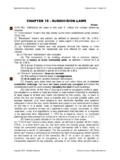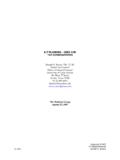Transcription of HOMESTEAD – THE SURVIVING SPOUSE AND …
1 2012 Shane Kelley. All rights reserved. HOMESTEAD THE SURVIVING SPOUSE AND TRUSTS By Shane Kelley, Esq. The Kelley Law Firm, PL 3365 Galt Ocean Drive Fort Lauderdale, FL 33308 I. INTRODUCTION The purpose of the HOMESTEAD provisions as contained in Article X, section 4(c) of the Florida Constitution and Chapters 731 733 of the Florida Statutes are to protect families in Florida. Accordingly, the owner of a HOMESTEAD , as well as the SURVIVING SPOUSE and descendants of a deceased HOMESTEAD owner, are granted certain protections with regard to the HOMESTEAD property. Those protections consist of both a creditor exemption for the HOMESTEAD property as well as a set of devise restrictions designed to limit the ability of the owner to devise the HOMESTEAD property when he or she is survived by a SURVIVING SPOUSE or minor descendants.
2 In addition to the constitutional provisions, there are several statutes contained in the Florida Probate Code that control the descent and devise of HOMESTEAD . See (33), , , , (1) and In 2010 there was significant legislation concerning the descent and devise of HOMESTEAD and the rights of a SURVIVING SPOUSE in relation to the HOMESTEAD property. This outline reviews the rights of a SURVIVING SPOUSE in HOMESTEAD property, including those important changes in 2010. Finally, there has been significant confusion in the case law regarding HOMESTEAD property held in a revocable trust or HOMESTEAD property that pours over into a revocable trust upon the death of the grantor. Recent case law has clarified some of the confusion on this issue, but many more questions remain unanswered. This outline reviews some of those issues.
3 II. ELECTION OF SURVIVING SPOUSE IN HOMESTEAD PROPERTY Article X, Section 4 of the Florida Constitution provides creditor protection for the owner of HOMESTEAD property as well as the SPOUSE and heirs of the owner upon his or her death. The devise restrictions on the HOMESTEAD property are also contained in Article X, Section 4 of the Florida Constitution. While the Florida Constitution provides for certain devise restrictions on HOMESTEAD property, it does not address how that property descends upon the death of the owner of the HOMESTEAD . The descent of HOMESTEAD property is covered in the Florida Statutes, specifically Page 2 a. Article X, Section 4, Florida Constitution Provides creditor protection for the owner of HOMESTEAD property as well as the SPOUSE and heirs of the owner upon his or her death and institutes certain devise restrictions on the property if the owner is survived by a SPOUSE or a minor child, (a) There shall be exempt from forced sale under process of any court, and no judgment, decree or execution shall be a lien thereon, except for the payment of taxes and assessments thereon, obligations contracted for the purchase, improvement or repair thereof, or obligations contracted for house, field or other labor performed on the realty, the following property owned by a natural person.
4 (1) a HOMESTEAD , if located outside a municipality, to the extent of one hundred sixty acres of contiguous land and improvements thereon, which shall not be reduced without the owner's consent by reason of subsequent inclusion in a municipality; or if located within a municipality, to the extent of one-half acre of contiguous land, upon which the exemption shall be limited to the residence of the owner or the owner's family; (2) personal property to the value of one thousand dollars. (b) These exemptions shall inure to the SURVIVING SPOUSE or heirs of the owner.. (c) The HOMESTEAD shall not be subject to devise if the owner is survived by SPOUSE or minor child, except the HOMESTEAD may be devised to the owner's SPOUSE if there be no minor child.
5 The owner of HOMESTEAD real estate, joined by the SPOUSE if married, may alienate the HOMESTEAD by mortgage, sale or gift and, if married, may by deed transfer the title to an estate by the entirety with the SPOUSE . If the owner or SPOUSE is incompetent, the method of alienation or encumbrance shall be as provided by law. b. (1) - While Article X, Section 4 of the Florida Constitution provides for the devise restrictions on HOMESTEAD property, (1) controls the descent and devise of restricted HOMESTEAD property. If the owner of HOMESTEAD real property attempted to devise HOMESTEAD in a manner not permitted by the constitution, or failed to make a devise of the HOMESTEAD , (1), Florida Statutes, provides: Page 3 .. the HOMESTEAD shall descend in the same manner as other intestate property; but if the decedent is survived by a SPOUSE and one or more descendants, the SURVIVING SPOUSE shall take a life estate in the HOMESTEAD , with a vested remainder to the descendants in being at the time of the decedent's death per stirpes.
6 I. A Life Estate the SPOUSE Can't Afford. Because the SURVIVING SPOUSE only has a life estate, he or she has a duty to the remaindermen to maintain the property. If the SURVIVING SPOUSE cannot afford to do so, selling the home may be an option, but is possible only if the remaindermen agree. The sale, however, creates complex estate and gift tax issues affecting all parties involved. The remedy of a partition action under Chapter 64, Florida Statutes, is not available to force the sale of the property since the remaindermen (descendants) do not have a current possessory interest in the property. c. (2) - Subsection (2) was created to provide the SURVIVING SPOUSE with a choice upon the death of the first SPOUSE . The SPOUSE can accept the life estate provided under Subsection (1) or elect to take an undivided one-half interest in the HOMESTEAD , with the decedent's descendants receiving the other undivided one-half interest: (2) In lieu of a life estate under subsection (1), the SURVIVING SPOUSE may elect to take an undivided one-half interest in the HOMESTEAD as a tenant in common, with the remaining undivided one-half interest vesting in the decedent s descendants in being at the time of the decedent s death, per stirpes.
7 I. This alternative creates a tenancy in common relationship between the SPOUSE and the decedent's descendants. The law applicable to tenancy in common interests is clearer in the areas of valuation, allocation of ownership expenses, and division of sale proceeds. In addition, the SURVIVING SPOUSE could utilize the partition procedures under Chapter 64 that are not available to a life tenant. One half of the net proceeds of the partition action would be payable to the SURVIVING SPOUSE and the balance would be payable to the vested remaindermen. ii. The election should not jeopardize any HOMESTEAD -related property tax provisions as to the SURVIVING SPOUSE 's interest. Florida Statutes section provides that a change of ownership in HOMESTEAD real property results in the reassessment of HOMESTEAD property values to current just value as of January 1 in the year following the change of ownership .
8 Page 4 Section (c)(3) provides that there is no change of ownership when the change in ownership is by operation of law under section Under section (8) a HOMESTEAD owner can apply the benefits of the Amendment 10 Cap to a new HOMESTEAD . This would benefit the SURVIVING SPOUSE who elects an undivided one-half interest in the HOMESTEAD , sells his or her interest, and then establishes a new HOMESTEAD . iii. Subsection (2)(a) describes who may make the election, when the election must be made, and the manner of making the election. 1. The SURVIVING SPOUSE may make the election. 2. The SURVIVING SPOUSE s guardian or attorney-in-fact may also make the election, but the election can be made only after the court finds that the election is necessary for the SPOUSE s best interests, taking into account the SURVIVING SPOUSE s life expectancy.
9 The amendment is patterned after the elective share procedures found in section , Florida Statutes. iv. Subsection (2)(b) addresses the time for making the election by the SURVIVING SPOUSE and provides that the election must be filed within six months of the decedent's death. Although the SURVIVING SPOUSE would have a short period of time to make the election, he or she would still benefit from the constitutional protections by receiving a life estate in the HOMESTEAD if no election is made. 1. When the decedent's estate is required to file a federal estate tax return and pay estate tax (which is due within 9 months after the date of death), it is critical to know whether the HOMESTEAD election has been made in advance of the due date for the filing of the return and payment of tax. The life estate provided to the SURVIVING SPOUSE under section is eligible for the marital deduction to the extent of the full value of the property under Internal Revenue Code section 2056.
10 The election to take an undivided one-half interest would result in only the value of a interest in the HOMESTEAD being eligible for the marital deduction. Whether the SPOUSE accepts a life estate or elects a interest, persons other than the SPOUSE could be affected significantly by the reduction in the estate tax marital deduction by the value of a interest in the 1 Protected HOMESTEAD property is exempt from estate tax apportionment under Florida Statutes section , so others pay the tax, if any. Page 5 v. Subsection (2)(c) provides that the time for making the election is tolled when a guardian or attorney in fact petitions the court for approval to make the election. 1. Prior to the 2012 amendment, Subsection (2)(c) read as follows, A petition by an attorney in fact or guardian of the property for approval to make the election tolls the time for making the election until 6 months after the decedent s death or 30 days after the rendition of an order authorizing the election, whichever occurs last.
